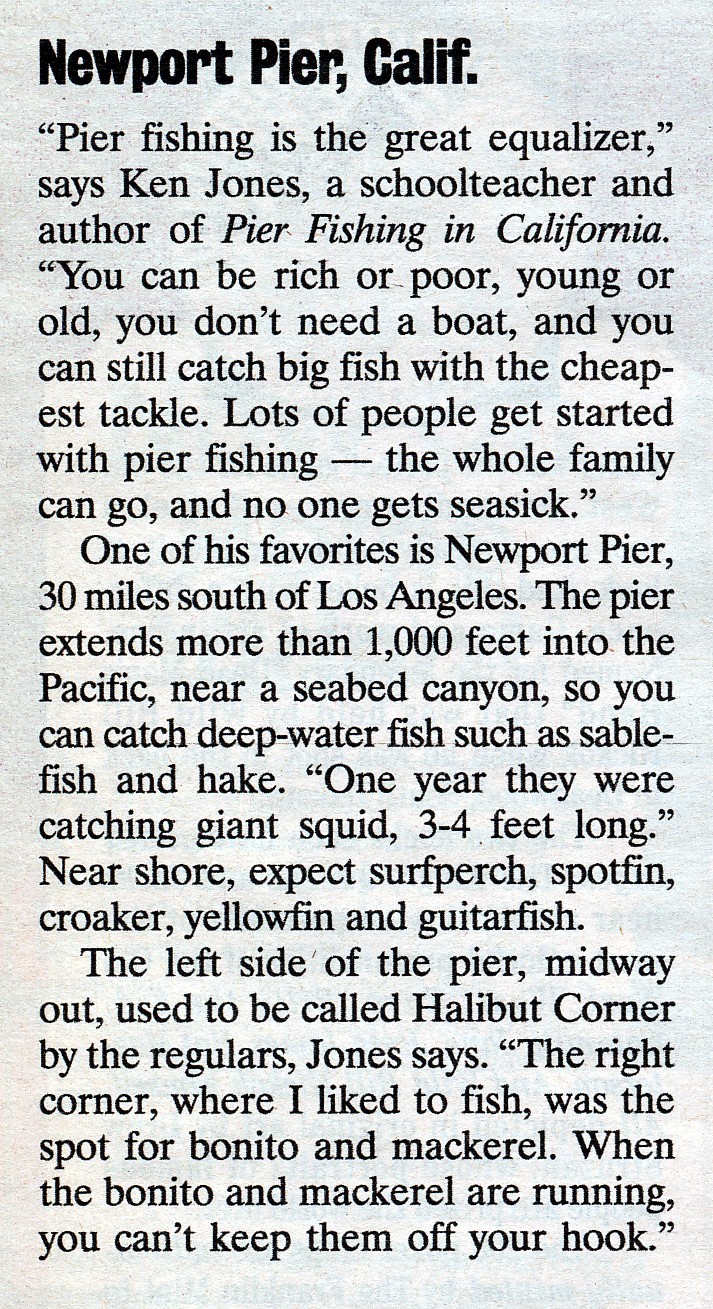I love these old stories — especially when I was at the pier that year and DIDN”T have a squid jig (so no squid for me). Of course when I was teaching I was taught never to use the word “Oriental” for Asians. Times have changed.
Record Squid Run Attracts Eager Casters
Newport Beach — It was a perfect summer evening — windless and warm. At sundown, Oriental fishermen swarmed over the Newport Pier.
Someone shouted: “Here they come.” Then the excitement began. Hundreds of lines were cast in an attempt to catch a school of giant squid.
Giant squid, native of Japan, arrived on the Orange County coast in late June in what has been called one of the longest runs ever noted. The squid, 10-armed sea mollusks, are on a 30-year spawning cycle. They won’t return here for approximately 35 to 40 years according to Nick Phoenix, owner of the Newport Pier Tackle Shop.
“I’ve seen ‘em run four or five days,” Phoenix said recently. “But I’ve never heard of a run like the one we’re having.” The squid started running June 26 and while now slowing haven’t stopped. “We’re expecting a run heavier than this one sometime soon,” added Chuck Beriotti, a tackle shop employee. “Another group has been spotted just north of San Diego.”
The squid have been spotted throughout Southern California, but are most numerous at Balboa, Newport and Huntington Beach piers, according to Phoenix, a 20-year fishing veteran. We’ve been averaging 1,500 fishermen a night,” Bertotti said. “Ninety percent are Oriental.”
Squid is an Oriental delicacy. It is usually purchased at Oriental markets. But not this summer.
“We don’t know when we would have a chance like this again,” said Herb Yamamoto, a Japanese-American from La Palma. “So while the catching is good we might as well catch them.” A veteran fisherman hauled in enough squid to fill three or four trashcans. But most fishermen caught about 20 a night. Squid not used immediately are frozen.
Phoenix said unusually warm ocean currents in Mexico have prolonged the run. The squid run from sundown to sunup, but never during daylight hours. “There’s really no trick to catching them,” Yamamoto said. “Lower the fishing line five or six feet under the water and move it to attract them.”
Phoenix added: “Squid are attracted to the lights of the pier.” There’s no need for live bait, although squid do eat small fish. Yamamoto said a squid jig, with seven different colors, is an excellent fishing device.
There was a scarcity of jigs but that was not the only problem the squid run caused. “One night it was so crowded you couldn’t walk out here,” Bertotti said. “A man suffered a heart attack and we couldn’t even get the ambulance close to him.” “It’s like Little Tokyo out here. They’ve even had special charters busing Orientals in,” he added. “I wouldn’t be surprised to see Orientals from San Francisco or Hawaii come here just for the squid,” Yamamoto said. “This is a big thing to us.”
“They want all they can get,” Phoenix said. “We’ve had to keep our boys on guard to keep the peace out here.” Angel Alvarez, 22, another tackle shop employee, added: “Most of the problems have been arguments over tangled lines. They’re practically on top of each other when the squid start hitting.”
Yamamoto said it’s hard to predict a run. “Squid are funny: they come and go.” But once squid hit, the catching is easy. They don’t put up a fight like most fish. Although weighing anywhere from one to six pounds, the squid can be pulled in directly, once hooked. “But there is a challenge to it,” Yamamoto added. “It’s more than fishing for food. I’m out here because it’s relaxing and fun. I’m on vacation right now.”
However, most fishermen, many with families, were here for one reason — to catch a good-eating seafood. “Squid can be cooked in many forms,” Yamamoto said. “Orientals like it raw or cooked with soy sauce. It can be boiled or deep-fried.”
Squid also is used to make jewelry. “Orientals use the eyes to make shiny necklaces,” Bertotti said.
Whatever the reason, everyone agreed that fishing for squid was fun. “Just another one of those perfect summer evenings,” said a Chinese youth as he pulled in another one.
—Elliott Almond, Los Angeles Times, July 20, 1976
















